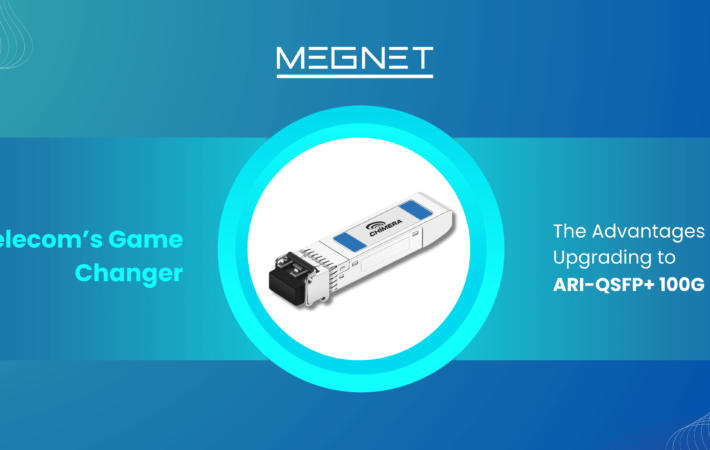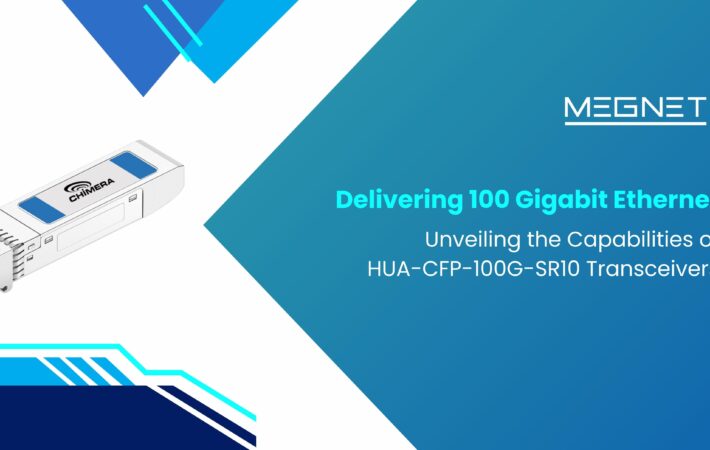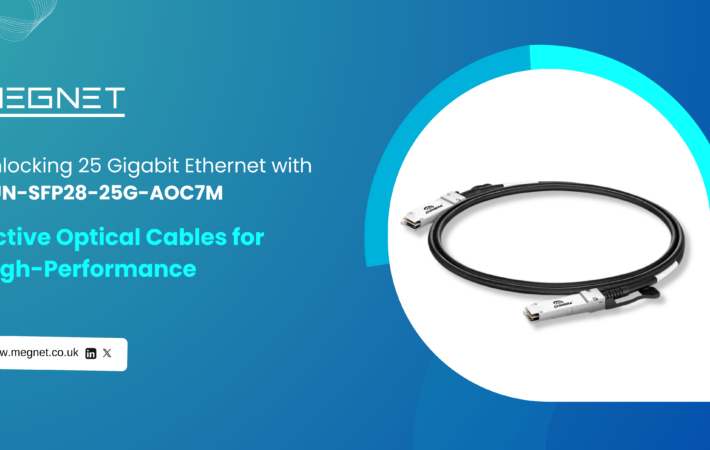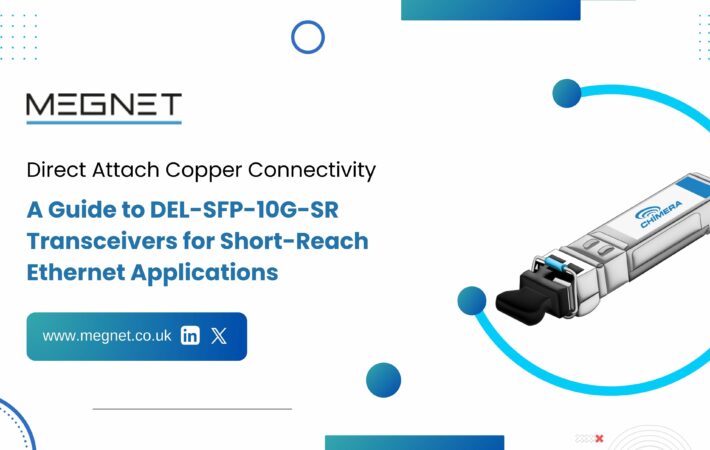
Unleash Network Performance: SFP+ Technology and HUA-SFP-10G-CU3M
The ever-growing demand for data creates a constant need for faster and more reliable networking solutions. Traditional options struggle to keep pace, especially in data centers, high-performance computing, and enterprise networks. SFP+ technology appears as a game-changer, offering a compact and powerful solution for high-speed connections.
This blog dives into SFP+, exploring its benefits and applications. We’ll also introduce the HUA-SFP-10G-CU3M, a specific SFP+ module ideal for short-distance connections within a data center. By the end, you’ll understand how SFP+ technology, and the HUA-SFP-10G-CU3M in particular, can future-proof your network for maximized performance.
Understanding SFP+ Technology
SFP+ (Small Form-factor Pluggable Plus) is a standardized interface that enables modular and high-bandwidth data connectivity. These compact modules plug into network switches and routers, providing flexible and scalable enterprise networking solutions. A key advantage of SFP+ is its hot-swapping capability, allowing for module replacement or upgrades without powering down the network equipment.
The benefits of SFP+ technology is numerous. Primarily, SFP+ modules support 10 Gigabit Ethernet (10GbE) connections, translating to ten times faster data transfer speeds compared to traditional Gigabit Ethernet. This significant boost in bandwidth is crucial for applications that deal with massive datasets and require real-time data processing.
Furthermore, SFP+ offers remarkable versatility. SFP+ transceivers can support various protocols beyond 10 Gigabit Ethernet, including Fibre Channel and FCoE (Fibre Channel over Ethernet). This protocol flexibility allows for seamless integration with existing network infrastructure and future-proofs your network for evolving technologies.
Applications of SFP+ Technology
SFP+ technology finds application in a wide range of networking scenarios. Here are some prominent applications of SFP+ transceivers:
- High-Performance Computing (HPC) clusters: HPC environments require high-bandwidth, low-latency connections to facilitate seamless communication between computer nodes. SFP+ effectively addresses this need by providing the necessary speed and reliability for data intensive HPC workloads.
- Enterprise data centers: Data centers house critical business applications and require robust networking infrastructure to ensure smooth operation. SFP+ plays a vital role in data centers by offering a scalable and high-performance solution for inter-server and server-to-storage connectivity.
- Top-of-Rack Switching: Top-of-rack switches provide connectivity between servers within a rack in a data center. Huawei SFP Modules are ideal for top-of-rack switching due to their compact size and ability to deliver high-speed connections over short distances.
- Network Storage Solutions: Network Attached Storage (NAS) and Storage Area Networks (SANs) rely on high-bandwidth connections for efficient data access. SFP+ modules provide the necessary performance to ensure fast and reliable data transfer between storage devices and servers on the network.
Introducing HUA-SFP-10G-CU3M
HUA-SFP-10G-CU3M stands out as a specific type of SFP+ module known as an SFP+ Direct Attach Cable (DAC). DACs offer a compelling alternative to fiber optic SFP+ transceivers, particularly for short-distance connections within a rack or data center. Unlike fiber optic solutions that transmit light signals, HUA-SFP-10G-CU3M utilizes copper twinax cables, providing a cost-effective and user-friendly approach to high-speed data transmission.
Delving into the Construction:
HUA-SFP-10G-CU3M boasts a straightforward design. It features two SFP+ transceiver connectors on either end, seamlessly integrating into SFP+ ports on network switches and routers. These connectors house the electronic circuitry responsible for signal conversion and data transmission.
Connecting the two transceiver connectors is a high-quality copper twinax cable. Twinax cables consist of two insulated copper conductors twisted together, ensuring efficient signal transmission and minimizing electromagnetic interference (EMI).
In-Depth Look at HUA-SFP-10G-CU3M
The HUA-SFP-10G-CU3M is an SFP+ DAC module manufactured by Huawei. This module boasts 10GbE support and features a 3 Meter Copper SFP+ Cable for connecting network devices over short distances. Let’s delve deeper into its technical specifications:
- Data Rate: The HUA-SFP-10G-CU3M supports a data rate range typically 1.0625 Gbps to 10.52 Gbps, ensuring compatibility with various network applications.
- Cable Type and Length: This SFP+ DAC utilizes a passive copper twinax cable with a fixed length of 3 meters. It’s important to note that copper cables have limitations in terms of signal transmission distance compared to fiber optic options.
- Connector Type: The HUA-SFP-10G-CU3M features a standard SFP+ connector for seamless integration with SFP+ ports on compatible network devices.
- Power Consumption: This module is designed for low power consumption, translating to energy efficiency and reduced operational costs.
- Other Specifications: Additional specifications may include operating temperature range, bend radius limitations for the copper cable, and compliance with relevant industry standards.
Unveiling the Key Features:
HUA-SFP-10G-CU3M is equipped with a range of features that make it a valuable asset for your network:
- Data Rate Flexibility: This SFP+ DAC supports a wide range of data rates, typically from 1.0625 Gbps to 10.52 Gbps. This versatility allows it to cater to various networking applications, from Gigabit Ethernet to full 10 Gigabit Ethernet connectivity.
- Optimized Cable Length: The 3-meter cable length of HUA-SFP-10G-CU3M is specifically designed for short-distance connections. This length is ideal for inter-device connections within a rack or across adjacent racks in a data center. The targeted length minimizes signal attenuation, ensuring reliable data transmission at the supported data rates.
- Low Power Consumption: A significant advantage of HUA-SFP-10G-CU3M is its low power consumption. Copper cables require less power to transmit data compared to fiber optic solutions. This translates to lower operating costs and contributes to a more energy-efficient data center environment. Additionally, the lower heat generation of copper cables compared to SFP+ transceivers that receive power over the cable reduces cooling needs within the network infrastructure.
- Broad Compatibility: HUA-SFP-10G-CU3M is designed for compatibility with a wide range of Huawei networking equipment. This compatibility ensures seamless integration into your existing network infrastructure, eliminating the need for additional configuration or compatibility checks.
Advantages of Using HUA-SFP-10G-CU3M
HUA-SFP-10G-CU3M offers several advantages over traditional fiber optic SFP+ transceivers, particularly for short-distance connections:
- Cost-Effective Alternative: Compared to fiber optic SFP+ transceivers, HUA-SFP-10G-CU3M presents a more budget-friendly option for short-distance connections. The lower material cost of copper cables translates to significant savings, especially for deployments requiring multiple SFP+ modules.
- Easy Installation: HUA-SFP-10G-CU3M boasts a user-friendly, plug-and-play design. The lightweight and flexible copper cable simplifies installation and reduces deployment time. Additionally, SFP+ modules offer hot-swapping capabilities, allowing for easy replacement or upgrades without network downtime
- Improved Signal Integrity (in some cases): While fiber optics generally offer superior signal integrity over long distances, copper cables can, in some cases, provide better signal integrity for short-distance connections. This is because copper experiences less modal dispersion, a phenomenon that can distort signals in fiber optic cables over short runs.
Considerations for Using HUA-SFP-10G-CU3M
While HUA-SFP-10G-CU3M offers a compelling package of features and benefits for short-distance networking, it’s crucial to consider some limitations before deployment. A clear understanding of these limitations will help you make an informed decision about whether HUA-SFP-10G-CU3M aligns perfectly with your specific network needs.
Cable Length Restriction:
The 3-meter cable length of HUA-SFP-10G-CU3M is specifically designed for short-distance connections. This is a strength for applications within a rack or across adjacent racks, but its reach has limitations. For longer inter-rack connections exceeding 3 meters, fiber optic SFP+ transceivers become the preferred choice.
Fibre optic cables excel at transmitting signals over extended distances with minimal signal loss. Using HUA-SFP-10G-CU3M for longer distances can lead to significant signal attenuation, potentially compromising data integrity and network performance.
Signal Attenuation and Data Rate:
As mentioned earlier, signal strength can weaken over longer copper cable lengths. This phenomenon, known as signal attenuation, becomes more pronounced as the cable distance increases.
While HUA-SFP-10G-CU3M supports data rates up to 10.52 Gbps, the achievable data rate can be limited by signal attenuation over distances exceeding the recommended 3 meters. To ensure reliable high-speed data transmission, it’s essential to adhere to the recommended cable length for HUA-SFP-10G-CU3M.
Heat Generation:
Although significantly lower than some active fiber optic solutions, copper cables do generate some heat. This might be a consideration in high-density environments where proper ventilation is crucial to maintain optimal operating temperatures for network equipment.
In situations with limited airflow or a densely packed rack, the heat generation of multiple HUA-SFP-10G-CU3M modules could require additional cooling measures to prevent overheating and potential equipment failure.
Alternative Considerations:
Depending on your specific network layout and requirements, alternative solutions might be worth exploring. For longer distances exceeding 3 meters, fiber optic SFP+ transceivers offer a reliable and high-performance option.
Additionally, for scenarios requiring even higher bandwidths beyond 10 Gigabit Ethernet, there are SFP+ transceivers that support speeds of 40 Gbps or even 100 Gbps. However, these higher-speed options typically come at a higher cost point compared to HUA-SFP-10G-CU3M.
By carefully considering these limitations and potential alternatives, you can make the most informed decision when selecting the optimal SFP+ solution for your network’s short-distance connections.
Conclusion
In conclusion, SFP+ technology empowers networks to handle the data deluge of today and tomorrow. The HUA-SFP-10G-CU3M exemplifies the potential of SFP+ DACs, providing a cost-effective and reliable solution for short-distance, high-bandwidth applications.
However, navigating SFP+ compatibility and finding reliable vendors can be a challenge. That’s where Megnet comes in. Megnet offers a comprehensive line of Chimera SFP+ products, guaranteed to be 100% compatible with your network devices.
Don’t settle for compatibility headaches – trust Chimera SFP+ solutions for seamless network performance. Visit Megnet’s website today to explore their wide selection of SFP+ products and find the perfect fit for your network upgrade needs!

FAQ's
SFP+ finds applications in High-Performance Computing clusters, data centers for connecting network devices, top-of-rack switching for high-bandwidth connections within a rack, and network storage for efficient data access.
Knowing your SFP+ module's MSA (Multi-Source Agreement) like SFP-MSA or SFF-8431 ensures compatibility with a wider range of network devices. Different MSAs define specifications for SFP+ modules, and matching standards guarantee functionality across various brands.
In most cases, the network device will not recognize the module or may display an error message. It's crucial to use compatible modules to avoid damaging the device or network.
No, SFP+ and QSFP+ modules are incompatible due to different sizes and functionalities. SFP+ ports are smaller and handle lower bandwidths, while QSFP+ ports accommodate larger modules for transmitting multiple 10Gbps channels for a higher overall bandwidth.
BiDi SFP+ uses a single fiber for both directions (Bi-directional) with different wavelengths for transmit and receive. CWDM SFP+ uses multiple wavelengths on a single fiber, allowing transmission of several data streams simultaneously.
The type of DOM (Digital Optical Monitoring) interface your HUA-SFP-10G-CU3M cables and module use depend on the specific module and manufacturer. There's no universal standard. Some common interfaces include SFP-MSA (SFF-8472) or vendor-specific options. Consult your module's documentation or contact the manufacturer to determine the exact DOM interface used.
When troubleshooting SFP+ connectivity issues, first verify compatibility, ensure the module is securely inserted, and for copper SFP+ modules, inspect the cable for any physical damage.
Most SFP+ modules are plug-and-play, functioning automatically upon insertion. However, some advanced modules might require basic configuration settings accessible through the network device's management interface. Consult the SFP+ module's documentation for specific configuration details.
SFP+ DACs (Direct Attach Cables) are a type of SFP+ module utilizing copper cables for cost-effective, short-distance connections within a network. They offer a lower-priced alternative to fiber optic SFP+ modules but with limitations in reach due to signal degradation over longer distances.
SFP+ modules typically support a data rate range of 1.0625 Gbps to 10.52 Gbps. This range allows them to handle various network applications, with the most common being 10 Gigabit Ethernet (10GbE).








Leave a comment
Your email address will not be published. Required fields are marked *